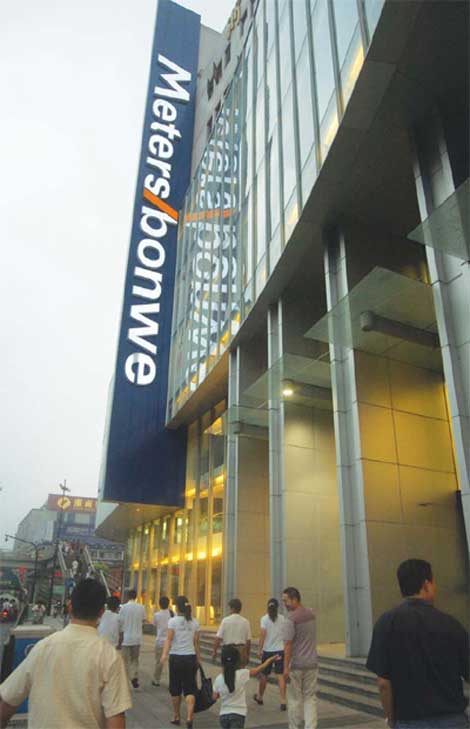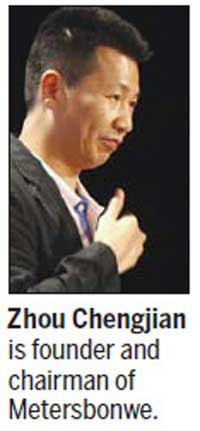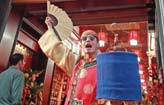Stitched up for success
Updated: 2011-06-24 11:10
By Mike Bastin (China Daily European Weekly)
 |
|
People walk past a Metersbonwe store in Hangzhou. The apparel maker has more than 3,000 stores nationwide. Xu Yan / for China Daily |
Success at home propels Wenzhou apparel maker to top 10 list in the world
We are all familiar with the China story and how important the nation is to the global economy. But it is not often that we hear of Chinese brands leaving a lasting impression in the marketplace.
Of course there are the big Chinese banks, insurers and telecom companies that have the pride of place in the global rankings, but there are also some lesser-known smaller brands that are trendsetters and pioneers in their respective segments.
According to data from the latest BrandZ survey, released by Millward Brown, an associate of global advertising giant WPP Inc, Chinese clothing brand Metersbonwe figures prominently in the top 10 most valuable global clothing brands.
At first glance, one would tend to dismiss the ranking as a mere statistic, but what makes the Wenzhou-based Metersbonwe a compelling tale is its remarkable transformation over the years, thanks to its modern approach to brand building and management.
The Shanghai-listed company leads the leisure apparel market in China and boasts of more than 3,000 stores nationwide. The company reported a sales turnover in excess of 10 billion yuan last year (1.08 billion euros).
 |
Like all success stories, Metersbonwe also started from humble origins. It was set up by Zhou Chengjian in Wenzhou in the early 1990s, with an initial capital of just 200,000 yuan. Zhou still runs the company and is a billionaire several times over, but his entrepreneurial spirit and drive continues to guide the company.
Much of today's success has its roots in the hands-on approach that Zhou has on the business. In the early years he was the sole trader and often worked late hours. In the night he doubled up as the tailor.
By 1992 he was tailoring thousands of winter coats for other factories and had reached a position from which he could build his own brand.
The first Metersbonwe store was opened in Wenzhou on April 22, 1995.
Considered by many as a pioneer in the Chinese apparel industry, Zhou decided to adopt the "virtual operation" business model and set up franchised chain stores that used the Metersbonwe corporate brand name.
Back then the company realized the importance of local market characteristics and changes in fashion and largely employed local designers but also brought in an experienced team from France for expert consultations.
That gamble paid off when Metersbonwe clocked growth of over 30 percent year after year.
Circa 2011 and nothing much seems to have changed. Much of the early strategy is still in place and the company focuses largely on the fashion conscious 18-25-year-old market segment, with affordable and good quality products.
Metersbonwe also works on a "light asset operation" business model that involves outsourcing most of its production and transportation requirements. Such an approach helps the company to focus on its core competencies like design, marketing and distribution.
To some extent the approach has also helped the company set up more direct-sale shops, and increase investment in logistics and factories, and also shape the brand to take on established foreign brands like Zara and H&M in China.
Currently, Metersbonwe's product portfolio can be divided into three product ranges - T-shirts, jeans and fashionable winter clothes, each with their own range and brand name like MTEE for T-shirts, Mjeans for jeans and MPolar for winter apparel.
The company has also roped in celebrities like Jay Chou, the famous Taiwanese singer, to make its products more appealing to other age groups also.
"Metersbonwe's brands have matured over the last two years," says Doreen Wang, group account director at market research company Millward Brown.
"The company has opened around 200 new stores over the last few years and continues to expand with excellent use of celebrity endorsements," she says.
Wang, however, sees other Chinese apparel retailers such as VANCL posing a stiff threat soon.
"Even though Metersbonwe's brands are now seen as more fashionable and trendy, they are also perceived as a little traditional and not as modern as VANCL," she says.
Norman Yao, Millward Brown's fashion and sports industry expert, says the main reason behind the brand's success is its insight into the Chinese clothing market and the awareness of changes in fashion among younger age groups.
"We have a top level design group and strong integration capability. We also developed a supply chain that can adapt to current and new future developments," says a Metersbonwe spokesperson.
But the immediate problem for the company is on how it should focus its future expansion.
"Metersbonwe's success in China has been impressive. But at present it lacks the resources and experience necessary to succeed in international markets and, therefore, should concentrate on increasing market penetration in China's first-tier cities," says Yao.
Such expansion, however, may not be that easy.
"Metersbonwe's biggest challenge is taking on the established Western brands in China's first-tier cities such as Zara, H&M, Nike and adidas. These brands have considerable brand building experience and investment behind them which have enabled them to raise sizeable barriers to entry," says Wang.
Eric Thun, lecturer in Chinese Studies at Oxford University's Contemporary China Studies Centre, feels that the "one of the most important challenges for a Chinese firm is getting the timing of global expansion right. The most fertile ground for building a brand is at home, and success at home should provide the foundation for global expansion".
But such an outlook may inhibit future growth prospects, says Morry Morgan, founder of Clarke Morgan Consulting and author of Selling Big in China, who feels that, "success for Chinese companies in international markets will result from learning and, therefore, some form of overseas market entry needs to start as soon as possible".
Morgan says that Metersbonwe should target overseas Chinese communities with their brands, especially overseas Chinese student groups in Australia, Canada and the UK.
E-paper

Franchise heat
Foreign companies see huge opportunities for business
Stitched up for success
The king's speech
Tough sail
Specials

Premier Wen's European Visit
Premier Wen visits Hungary, Britain and Germany June 24-28.

My China story
Foreign readers are invited to share your China stories.

Singing up a revolution
Welshman makes a good living with songs that recall the fervor of China's New Beginning.
